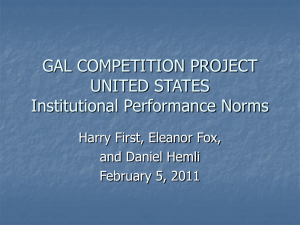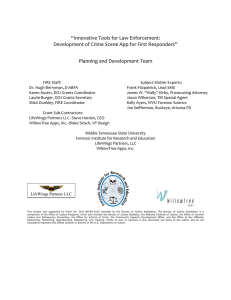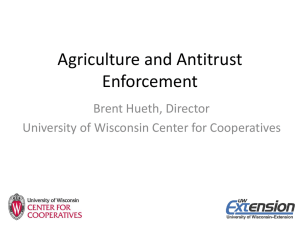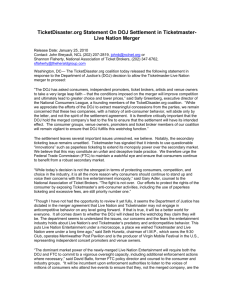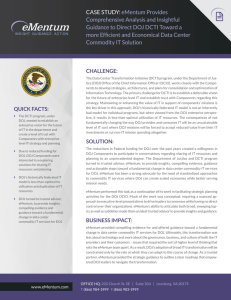DOJ Circular 41: Constitutionality & Right to Travel - Court Ruling
advertisement
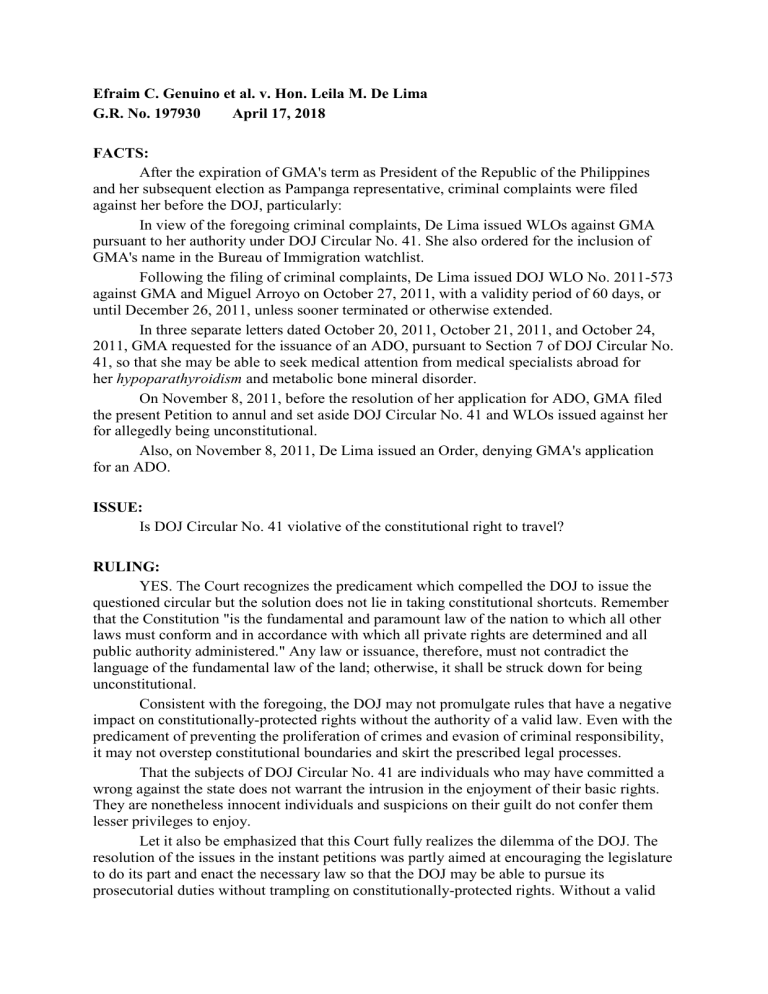
Efraim C. Genuino et al. v. Hon. Leila M. De Lima G.R. No. 197930 April 17, 2018 FACTS: After the expiration of GMA's term as President of the Republic of the Philippines and her subsequent election as Pampanga representative, criminal complaints were filed against her before the DOJ, particularly: In view of the foregoing criminal complaints, De Lima issued WLOs against GMA pursuant to her authority under DOJ Circular No. 41. She also ordered for the inclusion of GMA's name in the Bureau of Immigration watchlist. Following the filing of criminal complaints, De Lima issued DOJ WLO No. 2011-573 against GMA and Miguel Arroyo on October 27, 2011, with a validity period of 60 days, or until December 26, 2011, unless sooner terminated or otherwise extended. In three separate letters dated October 20, 2011, October 21, 2011, and October 24, 2011, GMA requested for the issuance of an ADO, pursuant to Section 7 of DOJ Circular No. 41, so that she may be able to seek medical attention from medical specialists abroad for her hypoparathyroidism and metabolic bone mineral disorder. On November 8, 2011, before the resolution of her application for ADO, GMA filed the present Petition to annul and set aside DOJ Circular No. 41 and WLOs issued against her for allegedly being unconstitutional. Also, on November 8, 2011, De Lima issued an Order, denying GMA's application for an ADO. ISSUE: Is DOJ Circular No. 41 violative of the constitutional right to travel? RULING: YES. The Court recognizes the predicament which compelled the DOJ to issue the questioned circular but the solution does not lie in taking constitutional shortcuts. Remember that the Constitution "is the fundamental and paramount law of the nation to which all other laws must conform and in accordance with which all private rights are determined and all public authority administered." Any law or issuance, therefore, must not contradict the language of the fundamental law of the land; otherwise, it shall be struck down for being unconstitutional. Consistent with the foregoing, the DOJ may not promulgate rules that have a negative impact on constitutionally-protected rights without the authority of a valid law. Even with the predicament of preventing the proliferation of crimes and evasion of criminal responsibility, it may not overstep constitutional boundaries and skirt the prescribed legal processes. That the subjects of DOJ Circular No. 41 are individuals who may have committed a wrong against the state does not warrant the intrusion in the enjoyment of their basic rights. They are nonetheless innocent individuals and suspicions on their guilt do not confer them lesser privileges to enjoy. Let it also be emphasized that this Court fully realizes the dilemma of the DOJ. The resolution of the issues in the instant petitions was partly aimed at encouraging the legislature to do its part and enact the necessary law so that the DOJ may be able to pursue its prosecutorial duties without trampling on constitutionally-protected rights. Without a valid legislation, the DOJ's actions will perpetually be met with legal hurdles to the detriment of the due administration of justice. The challenge therefore is for the legislature to address this problem in the form of a legislation that will identify permissible intrusions in the right to travel. Unless this is done, the government will continuously be confronted with questions on the legality of their actions to the detriment of the implementation of government processes and realization of its objectives. In the meantime, the DOJ may remedy its quandary by exercising more vigilance and efficiency in the performance of its duties. This can be accomplished by expediency in the assessment of complaints filed before its office and in the prompt filing of information in court should there be an affirmative finding of probable cause so that it may legally request for the issuance of HDO and hold accused for trial. Clearly, the solution lies not in resorting to constitutional shortcuts but in an efficient and effective performance of its prosecutorial duties. The Court understands the dilemma of the government on the effect of the declaration of unconstitutionality of DOJ Circular No. 41, considering the real possibility that it may be utilized by suspected criminals, especially the affluent ones, to take the opportunity to immediately leave the country. While this is a legitimate concern, it bears stressing that the government is not completely powerless or incapable of preventing their departure or having them answer charges that may be subsequently filed against them. In his Separate Concurring Opinion, Mr. Justice Carpio, pointed out that Republic Act No. 8239, otherwise known as the Philippine Passport Act of 1996, explicitly grants the Secretary of Foreign Affairs or any of the authorized consular officers the authority to issue verify, restrict, cancel or refuse the issuance of a passport to a citizen under the circumstances mentioned in Section 4 thereof. Mr. Justice Tijam, on the other hand, mentioned Memorandum Circular No. 036, which was issued pursuant to R.A. No. 9208 or the Anti-Trafficking in Persons Act of 2003, as amended by R.A. No. 10364 or the Expanded Anti-Trafficking in Persons Acts of 2012, which authorizes the BI to hold the departure of suspected traffickers or trafficked individuals. He also noted that the Commissioner of BI has the authority to issue a HDO against a foreigner subject of deportation proceedings in order to ensure his appearance therein. Similarly, the proposal of Mr. Justice Velasco for the adoption of new set of rules which will allow the issuance of a precautionary warrant of arrest offers a promising solution to this quandary. This, the Court can do in recognition of the fact that laws and rules of procedure should evolve as the present circumstances require.
